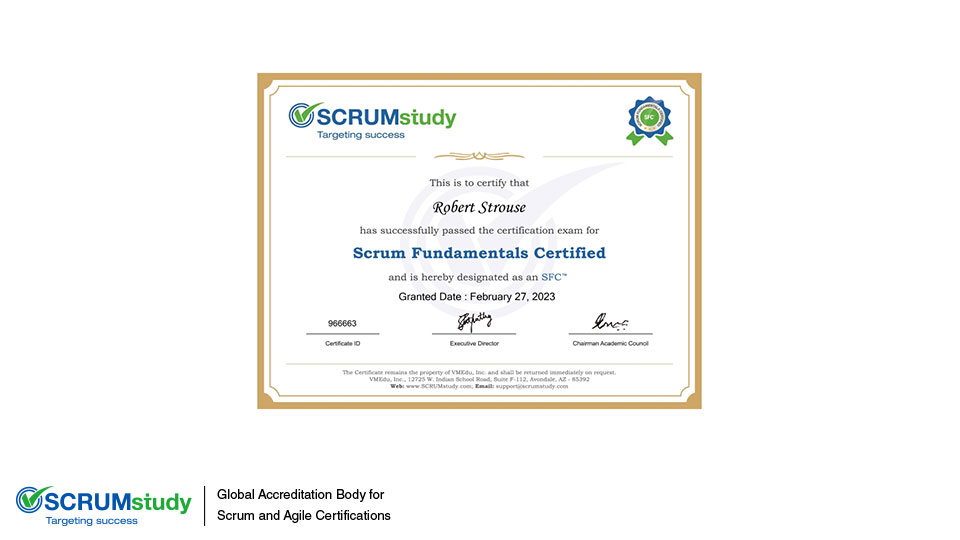Professional Scrum Master exam
Posted by SCRUMstudy® on June 24, 2024
Categories: Agile Certification SBOK® Guide Scrum Scrum Master Scrum Principles Training
The Scrum Master Certified (SMC) exam is a professional certification designed to validate an individual's expertise in Scrum principles and practices. Administered by various organizations, the exam typically covers topics such as Scrum roles, events, artifacts, and the implementation of Agile methodologies within project management. Candidates are tested on their ability to facilitate team collaboration, manage stakeholder engagement, and ensure the continuous delivery of high-value products. Achieving SMC certification demonstrates a comprehensive understanding of Scrum, positioning individuals as effective leaders and facilitators in Agile project environments.
Scrum Master certification exam, as provided by SCRUMstudy, is a comprehensive assessment designed to evaluate an individual's understanding of Scrum principles and practices. The exam typically consists of 100 multiple-choice questions, which must be completed within a 120-minute time frame. The questions cover a wide range of topics including Scrum roles, artifacts, events, and the overall Scrum framework. To pass the exam, a candidate must achieve a minimum score of 65%. The format is structured to test both theoretical knowledge and practical application of Scrum, ensuring that certified Scrum Masters are well-equipped to facilitate Scrum processes in real-world scenarios.
What is Scrum Master Certification (SMC®)?
The Scrum Master Certified (SMC®) certification is designed for individuals who aim to become proficient Scrum Masters. A Scrum Master plays a crucial role in ensuring that the Scrum Team functions smoothly and follows Scrum principles. They help the team clear obstacles and ensure the process adheres to Scrum practices.
Key Responsibilities of a Scrum Master
- Facilitating Scrum Practices: Teaching and reinforcing Scrum practices.
- Removing Impediments: Helping the team overcome obstacles.
- Ensuring Process Adherence: Making sure the team follows the Scrum framework.
Exam Format and Certification Process
Exam Details
- Format: Multiple choice
- Number of Questions: 100
- Duration: 120 minutes
- Mode: Proctored online exam
- Pass Rate: 95%
Steps to Certification
- Register: Sign up on SCRUMstudy.com and apply for the exam.
- Training: Optionally, attend a 2-day classroom training by a SCRUMstudy™ Authorized Training Partner.
- Exam Application: Pay the exam fee of USD 450 or use a voucher.
- Online Course Access: Study the online course and SBOK® Guide.
- Schedule Exam: Book a two-hour proctored exam.
- Take Exam: Complete the exam online.
Prerequisites
- No formal prerequisites, but SDC® (Scrum Developer Certified) is recommended.
- Participation in a 2-day training session is highly encouraged.
Maintaining the Certification
To maintain the Scrum Master Certification, professionals must either:
- Take the SMC® Recertification exam every three years.
- Earn any other SCRUMstudy™ certification.
Target Audience
The SMC® certification is ideal for:
- Aspiring Scrum Masters.
- Team members aiming to improve their Scrum knowledge.
- Professionals involved in project management and Agile practices.
Conclusion
Obtaining the Scrum Master Certification (SMC®) from SCRUMstudy™ is a strategic move for professionals looking to excel in Agile project management. The certification not only validates one's expertise in Scrum but also opens up new career opportunities and contributes to the overall efficiency of Scrum teams.

